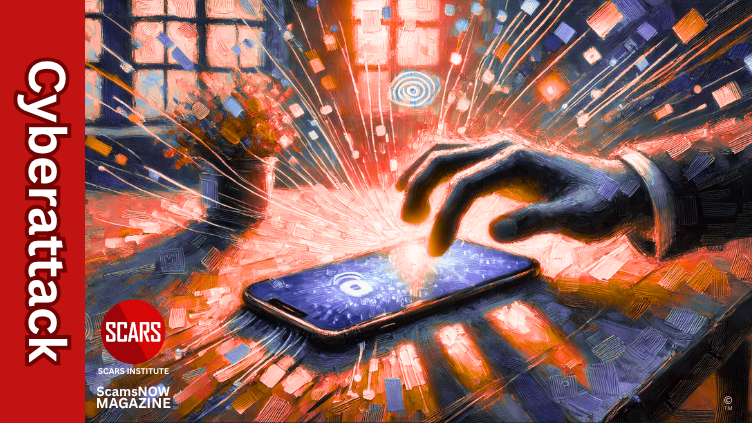U.S. Government Bans Woman Money Mule From Helping Scammers Anymore
In a First of Its Kind Decision, the U.S. Court Orders Money Mule to Stop Helping Scammers! This was Required Because She Would Not Stop!
Primary Category: Scam Victim’s Story
Authors:
• SCARS Editorial Team – Society of Citizens Against Relationship Scams Inc.
• United States Attorney’s Office, Department of Justice
About This Article
In a landmark decision, the U.S. Federal Government has barred Holly Freidamarie Locke, a 70-year-old Michigan woman, from participating in any further online romance scams. Locke, initially a victim herself, was deceived into acting as a “money mule,” transmitting funds for scammers. Despite police warnings and a signed cease and desist order, she continued facilitating scams.
U.S. District Judge Paul D. Borman approved a consent decree preventing Locke from aiding scammers. This decision, the first of its kind in Michigan, is part of a broader DOJ effort to combat international fraud rings exploiting U.S. citizens.
Locke’s case highlights the manipulation tactics used by scammers and the crucial role of money mules in these schemes. By cutting off this flow of money, the decree aims to protect potential victims and disrupt the operations of fraud networks. Locke did not admit liability in the decree.

A First of Its Kind Decision: United States Federal Government Bars a Michigan Woman from Further Participation in Online Romance Scams
A Scam Victim Turned Money Mule
A Jackson Michigan woman deceived into helping with online romance scams and money laundering has been barred by a federal court from aiding or interacting with scammers in any way.
U.S. District Judge for the Eastern District of Michigan Paul D. Borman approved a consent decree, on May 16, from federal prosecutors prohibiting Holly Freidamarie Locke, 70, from assisting, facilitating, or participating in any more romance scams, according to the United States Attorney’s Office Eastern District of Michigan.
The decree comes after investigators discovered Locke was repeatedly aiding romance scammers, acting as a “money transmitter” (money mule) while she herself was also being scammed, despite being told so by police who ordered her to stop, prosecutors said.
A money transmitter (money mule) aids in scams by receiving money from other victims and obscuring the transfer of funds from those victims to the scammer. Locke is alleged to have acted in this role after meeting and developing a romantic relationship with several scammers online, prosecutors said.
Locke began by aiding a scammer in Ghana in February 2022, believing she was helping him build an orphanage in Africa, according to the federal complaint.
Once their relationship developed, Locke began receiving numerous packages from strangers containing money, which she passed on to her purported fiancé/husband in Ghana. The money was sent from victims who believed they were assisting their own online romantic partners and friends, the complaint states.
After flagging several Priority Mail packages sent by Locke to Africa in 2022, U.S. Postal Inspectors intervened, investigated and told Locke she was the victim of a romance scam, prosecutors said, adding she signed a cease and desist order stating she would no longer interact with the scammer.
There were no further issues until May 2023, when Locke became a money transmitter (money mule) again in several other new scams involving people Locke met on Facebook who said they needed help paying medical bills, court records show.
This civil action against Locke is the first of its kind in the Eastern District of Michigan and is part of a broader trend in recent years by the Department of Justice to disrupt international fraud rings that target U.S. citizens through fake social media profiles, U.S. Attorney Dawn N. Ison said.
“This consent decree cuts off the flow of money from the victims to the international scammers behind these scams,” Ison said. “In an increasingly online world, people are under constant threat from unscrupulous people trying to compromise personal information or otherwise defraud them. This case should put scammers on notice that we will protect our citizens from this particularly cruel type of victimization.”
Locke did not admit liability as part of the consent decree, Ison said.
In a romance scam, a person typically starts talking to a stranger they meet online, not knowing the stranger intends to defraud them. After developing a friendship or romantic relationship where the victim is groomed, manipulated, and controlled, the scammer will ask the victim to send them money based on false claims about the need for the funds, officials involved in this case said.
If the victim does not have money to send, scammers often will use that person as a money transmitter (money mule) by routing payments from other victims to that person and instructing that person to transfer the money to the scammer, officials said.
According to the U.S. Attorney’s Office
United States Attorney Dawn N. Ison Announces First of Its Kind Civil Action in District to Combat International Fraud Ring
United States Attorney Dawn N. Ison announced today that a Jackson resident has agreed to a court order preventing her from participating in behavior that facilitates a suspected international fraud ring. This civil action is the first of its kind in the Eastern District of Michigan and is part of a broader trend in recent years by the Department of Justice to disrupt international fraud rings that target United States citizens through fake social media profiles.
As part of a civil consent decree approved by U.S. District Judge Paul D. Borman, Holly Locke, 70, is permanently prohibited from assisting, facilitating, or participating in any romance scam. A romance scam is typically a scheme in which an individual starts talking to a stranger they meet online, not knowing the stranger intends to defraud them. Eventually, after developing a friendship or romantic relationship, the scammer will ask the victim to send them money based on false representations about the need for the funds. If the victim does not have money to send, sometimes the scammer will use that person as a money transmitter by routing payments from other victims to that person and instructing that person to transfer the money to the scammer. A money transmitter plays a critical role in the scheme, by receiving the money from other victims and obscuring the transfer of funds from those victims to the scammer.
Locke is alleged to have acted as a money transmitter after meeting and developing a romantic relationship with a scammer online. Once the relationship developed, Locke then began receiving numerous packages from strangers containing money, which she passed on to her purported fiancé/husband. The money was sent from victims who believed they were assisting their own online romantic partners and friends. Locke did not admit liability as part of the consent decree.
“This office is committed to using every tool at our disposal to protect Americans from fraud,” said U.S. Attorney Ison. “This consent decree cuts off the flow of money from the victims to the international scammers behind these scams. In an increasingly online world, people are under constant threat from unscrupulous people trying to compromise personal information or otherwise defraud them. This case should put scammers on notice that we will protect our citizens from this particularly cruel type of victimization.”
“The U.S. Postal Inspection Service is dedicated to safeguarding all Americans from individuals who attempt to exploit them through fraudulent and deceptive schemes. Today’s civil action, unprecedented in the Eastern District of Michigan, should serve as a warning to anyone engaging in or abetting similar scams – you will be held accountable and brought to justice,” said Inspector in Charge Rodney M. Hopkins of the U.S. Postal Inspection Service, Detroit Division.
The agencies involved in this effort urge consumers to be on the lookout for signs someone is trying to recruit them to receive and transmit fraud proceeds. Do not agree to receive money or checks mailed to you or sent to your bank account for someone you have met over the phone or online. Do not open a bank or cryptocurrency account at someone else’s direction. Fraudsters will lie to persuade you to help them. They may falsely tell you that they are helping you get a lottery prize, initiate a purported romantic relationship, and then tell you that they need money, or pretend to offer you a job, an opportunity to invest in a business venture, or the chance to help in a charitable effort.
Those knowing anyone age 60 or older who has experienced financial fraud, should contact the National Elder Fraud Hotline: 1-833-FRAUD-11 (1-833-372-8311), which is open 10 a.m. to 6 p.m. Monday through Friday. English, Spanish, and other languages are available.
-/ 30 /-
What do you think about this?
Please share your thoughts in a comment below!
More Victims’ Related Information:
- Mariko Takeuchi – Romance Scam Victim Became An Unwitting Drug Mule – 2024 (scamsnow.com)
- Are You A Serial Scam Victim? Do You Know One? – 2024 (scamsnow.com)
- Why Are We More Likely To Trust Total Strangers Now? 2024 (scamsnow.com)
- Scam Victims: The Need To Tell Their Stories – The Need For Acceptance – 2024 (scamsnow.com)
- The Tragic Story Of Laura Kowal – A Romance Scam Victim Who Died Possibly At The Hands Of The Ghana/Nigerian Scammers – 2024 – [Videos] (scamsnow.com)
- A Desperate Scam Victim – Ann Mayers – Becomes A Bank Robber – 2024 [VIDEOS] (scamsnow.com)
Statement About Victim Blaming
SCARS Institute articles examine different aspects of the scam victim experience, as well as those who may have been secondary victims. This work focuses on understanding victimization through the science of victimology, including common psychological and behavioral responses. The purpose is to help victims and survivors understand why these crimes occurred, reduce shame and self-blame, strengthen recovery programs and victim opportunities, and lower the risk of future victimization.
At times, these discussions may sound uncomfortable, overwhelming, or may be mistaken for blame. They are not. Scam victims are never blamed. Our goal is to explain the mechanisms of deception and the human responses that scammers exploit, and the processes that occur after the scam ends, so victims can better understand what happened to them and why it felt convincing at the time, and what the path looks like going forward.
Articles that address the psychology, neurology, physiology, and other characteristics of scams and the victim experience recognize that all people share cognitive and emotional traits that can be manipulated under the right conditions. These characteristics are not flaws. They are normal human functions that criminals deliberately exploit. Victims typically have little awareness of these mechanisms while a scam is unfolding and a very limited ability to control them. Awareness often comes only after the harm has occurred.
By explaining these processes, these articles help victims make sense of their experiences, understand common post-scam reactions, and identify ways to protect themselves moving forward. This knowledge supports recovery by replacing confusion and self-blame with clarity, context, and self-compassion.
Additional educational material on these topics is available at ScamPsychology.org – ScamsNOW.com and other SCARS Institute websites.
-/ 30 /-
What do you think about this?
Please share your thoughts in a comment below!
SCARS LINKS: AgainstScams.org RomanceScamsNOW.com ContraEstafas.org ScammerPhotos.com Anyscam.com ScamsNOW.com
reporting.AgainstScams.org support.AgainstScams.org membership.AgainstScams.org donate.AgainstScams.org shop.AgainstScams.org
youtube.AgainstScams.org linkedin.AgainstScams.org facebook.AgainstScams.org
Important Information for New Scam Victims
- Please visit www.ScamVictimsSupport.org – a SCARS Website for New Scam Victims & Sextortion Victims.
- SCARS Institute now offers its free, safe, and private Scam Survivor’s Support Community at www.SCARScommunity.org – this is not on a social media platform, it is our own safe & secure platform created by the SCARS Institute especially for scam victims & survivors.
- SCARS Institute now offers a free recovery learning program at www.SCARSeducation.org.
- Please visit www.ScamPsychology.org – to more fully understand the psychological concepts involved in scams and scam victim recovery.
If you are looking for local trauma counselors, please visit counseling.AgainstScams.org
If you need to speak with someone now, you can dial 988 or find phone numbers for crisis hotlines all around the world here: www.opencounseling.com/suicide-hotlines
Statement About Victim Blaming
Some of our articles discuss various aspects of victims. This is both about better understanding victims (the science of victimology) and their behaviors and psychology. This helps us to educate victims/survivors about why these crimes happened and not to blame themselves, better develop recovery programs, and help victims avoid scams in the future. At times, this may sound like blaming the victim, but it does not blame scam victims; we are simply explaining the hows and whys of the experience victims have.
These articles, about the Psychology of Scams or Victim Psychology – meaning that all humans have psychological or cognitive characteristics in common that can either be exploited or work against us – help us all to understand the unique challenges victims face before, during, and after scams, fraud, or cybercrimes. These sometimes talk about some of the vulnerabilities the scammers exploit. Victims rarely have control of them or are even aware of them, until something like a scam happens, and then they can learn how their mind works and how to overcome these mechanisms.
Articles like these help victims and others understand these processes and how to help prevent them from being exploited again or to help them recover more easily by understanding their post-scam behaviors. Learn more about the Psychology of Scams at www.ScamPsychology.org
SCARS INSTITUTE RESOURCES:
If You Have Been Victimized By A Scam Or Cybercrime
♦ If you are a victim of scams, go to www.ScamVictimsSupport.org for real knowledge and help
♦ SCARS Institute now offers its free, safe, and private Scam Survivor’s Support Community at www.SCARScommunity.org/register – this is not on a social media platform, it is our own safe & secure platform created by the SCARS Institute especially for scam victims & survivors.
♦ Enroll in SCARS Scam Survivor’s School now at www.SCARSeducation.org
♦ To report criminals, visit https://reporting.AgainstScams.org – we will NEVER give your data to money recovery companies like some do!
♦ Follow us and find our podcasts, webinars, and helpful videos on YouTube: https://www.youtube.com/@RomancescamsNowcom
♦ Learn about the Psychology of Scams at www.ScamPsychology.org
♦ Dig deeper into the reality of scams, fraud, and cybercrime at www.ScamsNOW.com and www.RomanceScamsNOW.com
♦ Scam Survivor’s Stories: www.ScamSurvivorStories.org
♦ For Scam Victim Advocates visit www.ScamVictimsAdvocates.org
♦ See more scammer photos on www.ScammerPhotos.com
You can also find the SCARS Institute’s knowledge and information on Facebook, Instagram, X, LinkedIn, and TruthSocial
Psychology Disclaimer:
All articles about psychology and the human brain on this website are for information & education only
The information provided in this and other SCARS articles are intended for educational and self-help purposes only and should not be construed as a substitute for professional therapy or counseling.
Note about Mindfulness: Mindfulness practices have the potential to create psychological distress for some individuals. Please consult a mental health professional or experienced meditation instructor for guidance should you encounter difficulties.
While any self-help techniques outlined herein may be beneficial for scam victims seeking to recover from their experience and move towards recovery, it is important to consult with a qualified mental health professional before initiating any course of action. Each individual’s experience and needs are unique, and what works for one person may not be suitable for another.
Additionally, any approach may not be appropriate for individuals with certain pre-existing mental health conditions or trauma histories. It is advisable to seek guidance from a licensed therapist or counselor who can provide personalized support, guidance, and treatment tailored to your specific needs.
If you are experiencing significant distress or emotional difficulties related to a scam or other traumatic event, please consult your doctor or mental health provider for appropriate care and support.
Also read our SCARS Institute Statement about Professional Care for Scam Victims – click here
If you are in crisis, feeling desperate, or in despair, please call 988 or your local crisis hotline – international numbers here.
More ScamsNOW.com Articles
A Question of Trust
At the SCARS Institute, we invite you to do your own research on the topics we speak about and publish. Our team investigates the subject being discussed, especially when it comes to understanding the scam victims-survivors’ experience. You can do Google searches, but in many cases, you will have to wade through scientific papers and studies. However, remember that biases and perspectives matter and influence the outcome. Regardless, we encourage you to explore these topics as thoroughly as you can for your own awareness.















![NavyLogo@4x-81[1] U.S. Government Bans Woman Money Mule From Helping Scammers Anymore - 2024](https://scamsnow.com/wp-content/uploads/2025/04/NavyLogo@4x-811.png)










![scars-institute[1] U.S. Government Bans Woman Money Mule From Helping Scammers Anymore - 2024](https://scamsnow.com/wp-content/uploads/2025/04/scars-institute1.png)

![niprc1.png1_-150×1501-1[1] U.S. Government Bans Woman Money Mule From Helping Scammers Anymore - 2024](https://scamsnow.com/wp-content/uploads/2025/04/niprc1.png1_-150x1501-11.webp)